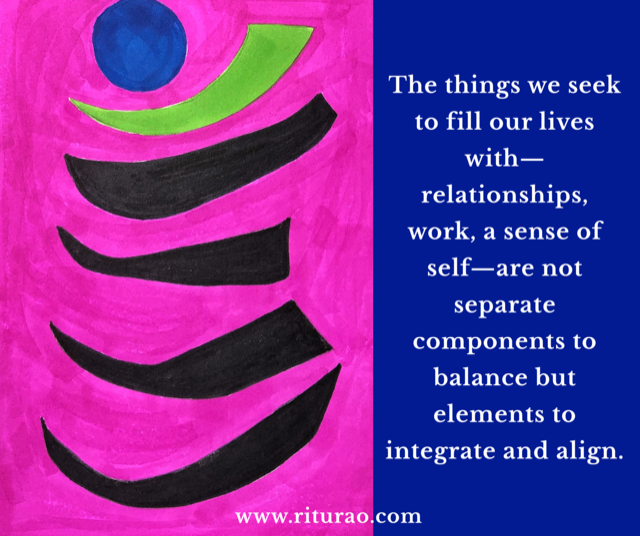
Balance is a word loaded with associations.
When you think about balance, you might visualize an ideal you aspire to.
You might hear the loud voices of society or your parents on what balance looks like.
You might imagine a sense of lightness and ease and peace (finally!).
Or, you might hear the whimpers stemming from your own exhaustion, from constantly trying to grasp at whatever your idea of balance might be.
Work. Life. Self.
In all the talk about finding balance, it’s as if we haven’t taken a single moment to wonder at the validity of trying to compartmentalize aspects of our life, as if it were simply a messy closet and if only we decluttered and organized our t-shirts and arranged the clothes hanging on the rack by color, we’d be all set.
If we were to admit this foolishness, and get real (and life, in general, rewards us handsomely when we Get Real), we’d realize that chasing balance is not only silly, but ultimately not useful.
The current idea of balance, especially work-life balance, appears TV-bred and magazine-spread; an image like many others we’ve been shown so many times in an effort to keep us running on a hamster wheel, always busy but not really getting anywhere.
Balance asks you to chase the wind.
You can spend your life chasing, or you can stop, stand up straight and face what’s in front of you.
You can stand with eyes open, fully understanding that things most of us seek to fill our lives with—relationships, work, a sense of self—are not separate components but elements which, when integrated and aligned with our truth, give us the fulfillment and satisfaction we seek from our very core.
So instead of looking for more balance in our lives—keeping all the parts of life on the same, precarious level—perhaps we should be looking to integrate rather than separate. We can then uncover for ourselves the sham that balance is unrealistic and unsustainable. We can be more aware, and ready to do what it takes when (not if) some aspect of life feels off-kilter.
Balance is often single-minded, demanding more and more from us; integration is reasoned and thoughtful, sometimes asking for more but not afraid to ask us to do less.
It can mean that it’s time to put in more effort (simplify and reset your priorities) to avoid burnout (do less but better).
It could mean that you need to cut back on screen time (reasoned but perhaps difficult) and give yourself some quality me-time (thoughtful, nurturing).
It could also mean, as we’re learning in current times, that we don’t need as much as we thought, and we can let go and still move on.
Instead of seeking but rarely achieving balance in our lives so things are closer to perfect while feeling the attendant guilt or shame, we can acknowledge that perfect is out the window and say to ourselves here’s what to do about things as they are (“get real”) so we can short-circuit the guilt or shame and instead observe, accept and shift forward.
Leave a Reply